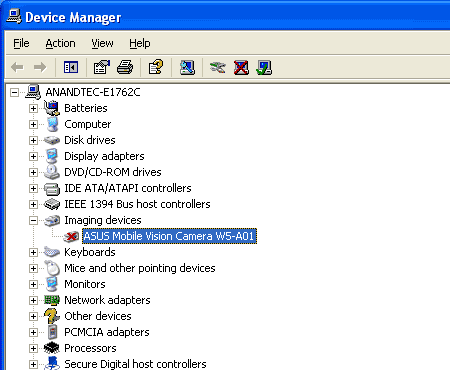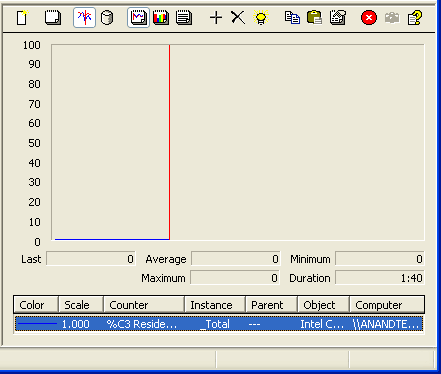Intel Core Duo USB Issue: A Mischaracterized Bug
by Anand Lal Shimpi on February 13, 2006 1:40 PM EST- Posted in
- Laptops
Problem #2 - Disabling a USB device doesn't work
If we now know that this problem should affect both Napa (Core Duo) and Sonoma (Pentium M) platforms, why is it that the results that we've seen to date don't support that theory? While we can only comment on tests that we've run ourselves, we did run into some issues with the ASUS W5F/W5A notebooks, which are quickly becoming popular Napa/Sonoma test platforms.
The reason that the two ASUS notebooks are nice to use is because they are virtually identical systems, one simply uses a Sonoma motherboard with a Pentium M CPU while the other uses a Napa board with a Core Duo CPU. In the end, it provides an excellent level playing field for comparing Core Duo to its predecessor.
With a USB 2.0 device (an external TV tuner) connected, but no driver installed, the battery life on our T60 dropped from 286 minutes down to 242, a reduction of 15.3%. Disabling the device had no effect either, as we recorded a battery life of 235 minutes. These findings are particularly important because both ASUS notebooks, the Sonoma and the Napa, feature an integrated USB 2.0 camera. Even without the drivers loaded, short of ripping the camera out of the system, these two notebooks are terrible reference points for the USB power draw issue as both of them exhibit the issue without even plugging in any external devices!
To confirm, we looked at C3 time once more on both platforms:
To further confirm, we applied the workaround documented in the Microsoft KB article. With no external devices connected to either system, their battery life jumped by approximately another hour:
While this means that our battery life tests from our Core Duo notebook article are significantly lower than they should be (we'll be providing a follow-up to that article in the near future), it also means that neither ASUS notebook should be used in pinpointing the cause or effects of this USB problem.
Adding an external USB 2.0 device to either ASUS notebook does result in an additional drop in battery life, but the initial damage is done by the integrated camera that you can't unplug. To truly isolate this problem, we'll need two notebooks that don't have any integrated USB 2.0 devices, which is why we turned to the Lenovo Thinkpad T43 and T60.
If we now know that this problem should affect both Napa (Core Duo) and Sonoma (Pentium M) platforms, why is it that the results that we've seen to date don't support that theory? While we can only comment on tests that we've run ourselves, we did run into some issues with the ASUS W5F/W5A notebooks, which are quickly becoming popular Napa/Sonoma test platforms.
The reason that the two ASUS notebooks are nice to use is because they are virtually identical systems, one simply uses a Sonoma motherboard with a Pentium M CPU while the other uses a Napa board with a Core Duo CPU. In the end, it provides an excellent level playing field for comparing Core Duo to its predecessor.

| Lenovo T60 | Nothing Connected | USB 2.0 Device Connected, No Driver Installed | USB Device Disabled |
| Reader 2002SE Battery Life in Minutes | 286 | 242 | 235 |
With a USB 2.0 device (an external TV tuner) connected, but no driver installed, the battery life on our T60 dropped from 286 minutes down to 242, a reduction of 15.3%. Disabling the device had no effect either, as we recorded a battery life of 235 minutes. These findings are particularly important because both ASUS notebooks, the Sonoma and the Napa, feature an integrated USB 2.0 camera. Even without the drivers loaded, short of ripping the camera out of the system, these two notebooks are terrible reference points for the USB power draw issue as both of them exhibit the issue without even plugging in any external devices!
To confirm, we looked at C3 time once more on both platforms:

The ASUS notebooks never enter C3 or lower power states, even with no external devices connected
To further confirm, we applied the workaround documented in the Microsoft KB article. With no external devices connected to either system, their battery life jumped by approximately another hour:
| Reader 2002SE Battery Life in Minutes | Nothing Connected | Nothing Connected (MS Fix Applied) |
| ASUS W5F (Napa/Core Duo) | 219 | 264 |
| ASUS W5A (Sonoma/Pentium M) | 204 | 273 |
While this means that our battery life tests from our Core Duo notebook article are significantly lower than they should be (we'll be providing a follow-up to that article in the near future), it also means that neither ASUS notebook should be used in pinpointing the cause or effects of this USB problem.
Adding an external USB 2.0 device to either ASUS notebook does result in an additional drop in battery life, but the initial damage is done by the integrated camera that you can't unplug. To truly isolate this problem, we'll need two notebooks that don't have any integrated USB 2.0 devices, which is why we turned to the Lenovo Thinkpad T43 and T60.










61 Comments
View All Comments
formulav8 - Monday, February 13, 2006 - link
Performance Monitor is built into windows. Goto Start/Settings and then Admin Tools and load the Performance application. That is what Anand is using.Jason